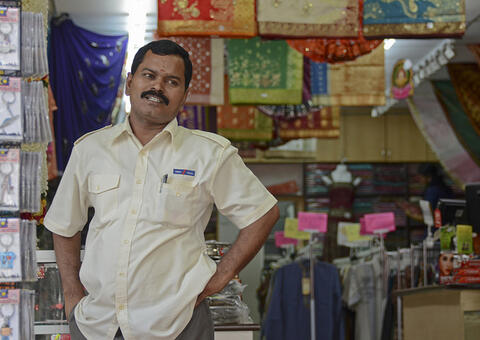Blog
Aureos Capital's Role in Financing SMEs across Asia, Africa and Latin America

Aureos works in the challenging field of SME investing in emerging markets. From small beginnings in 2001, Aureos has raised 17 regional funds and now has in the range of US$ 1.3 billion of funds under management. What are some key reasons behind your success?
Sev Vettivetpillai: Aureos - which was initially part of CDC group (UK’s Development finance Institution) - started its SMEs operation in 1990-92, investing primarily in companies where our investment size ranged from 100,000 to 2 million US$.
After its spin-off from CDC in 2001, Aureos started investing in companies where our investment size ranged typically from 3 to 6 million US$. Nowadays, Aureos is doing deals between 2 to 15 million US$.
In the 90s, Aureos’s investment strategy had a mixed outcome, with some success and some failure.
After 2001, having realized what did and did not work in the markets we adapted our
strategy to where:
- Country-specific funds were replaced by regional funds which included at least 3 countries from the same region. For example, our West-Africa fund includes Nigeria, Ghana and Senegal (although Cote d’Ivoire was our original strategy but due to civil unrest we moved to Senegal), 3 countries which represent 70% of the GDP and population of the region.
- Funds were diversified in terms of sectors.
- Aureos moved away from start-ups to more mature businesses (at least 3 - 5 years of business history with positive operating cash flows).
These new orientations helped minimize the volatility of the funds. In addition, political, sector and liquidity risks mitigation were made easier. From 2001, Aureos became successful because it followed this strategy consistently across all the markets we were entering into (Sub-Sahara Africa, Latin-America and the Central America, South-East Asia, and China).
Another factor of success was the human factor behind the funds. Our management teams comprise experienced experts who are recruited locally and who bring their in-depth knowledge of local business players and a well-established local network.
What kind of support did you receive from governments and donor organizations?
Sev Vettivetpillai: Although we do not seek direct help from governments, through our relationship with the Commonwealth Secretariat, an inter-governmental body, we have occasionally benefited from government funding i.e. Australia and New Zealand Governments provided assistance to help our Kula Fund for the Pacific to widen its target geography.
We receive grants from donors such as: the Norwegian Investment Fund for Developing Countries (Norfund), Netherlands Development Finance Company (FMO), International Finance Corporation (IFC), European Investment Bank (EIB), the Multilateral Investment Fund of the Inter American Development Bank (MIF), Gates Foundation, Proparco (French Development Agency), Elma Foundation and the Indian government:
IFC’s grant “SME Sustainable Opportunities Initiative” helped partner companies in Africa to implement strategies to mitigate environmental risks in their operations.
IFC, Gates Foundation, Proparco and Elma Foundation have set up the Africa Health Fund TA Facility to run alongside the Africa Health Fund and help achieve the latter’s objectives of increasing access and availability of health-related goods and services to those at the bottom of the pyramid.
The Indian government and Commonwealth Secretariat’s funding helped us build management capacity within SMEs we have invested in. We organized a 2-week training program led by top Indian business schools for senior and middle managers of our African portfolio companies. This program ran over 3 years and 200+ CEOs, CFOs and marketing managers attended in Africa and Asia (not including India).
FMO’s grant helped to provide value addition to 13 portfolio companies (operating across different sectors) in Africa, Asia and Africa. This included marketing studies for new markets and products; improving internal audit systems, new management information systems; and operational activities (resource planning systems, productivity and cost effective management system, review of supply chain functions, review of environmental, health and safety standards and accreditation for ISO 140001 & OHSAS 18001) and training in workplace effectiveness and competency development. In addition, it funded our manual on corporate governance.
FMO, Norfund and MIF set up the Emerge Fund’s TA Facility to help Emerge Fund’s partner companies to access grants for activities such as: investee specific training, management capacity building, business development services, corporate social responsibility and improving corporate governance.
Norfund funded an in-house HIV/AIDS prevention and awareness strategy in Aureos’ partner companies in East Africa. 8 partner companies have established these workplace programs.
What are the key challenges in financing SMEs (debt and private equity) in emerging markets?
Sev Vettivetpillai: Challenges in financing SMEs are not limited to bringing them more capital. Capital alone is not enough.
Before investing, we need to understand the companies in terms of financial performance and growth. SMEs often do not have clear strategies and business plans. Therefore it takes a lot of time to evaluate their performance.
Generally some adjustments are needed in terms of internal processes and governance once the investment is done and this means convincing SME owners to make those changes. This is a time-consuming process, very hands-on that cannot be underestimated.
In terms of capital structure, when SMEs try to reach other sources of financing beyond equity, SMEs usually don’t have access to the banks and don’t get loans easily. Through our own network with the banks, we help them raise appropriate capital.
In addition, environment, social and governance (ESG) are a big part of our investment processes because we believe it is a value-added component. Implementing ESG requirements also requires some dedication from our investment officers working closely with SME owners.
Aureos has put measures in place to ensure proper conduct of business in developing countries with regard to environment, social and governance (ESG) matters. Can you give us a few examples of this?
Sev Vettivetpillai: For example in Kenya, Aureos invested in a steel plant (Athi River Steel Plant). Their furnace was meeting local standards in terms of emissions but not international standards. We brought IFC and a specialist from Europe to improve those emissions. In terms of environment, if the company is seen to be helping the community as a whole, then it can build better brand awareness.
ESG policies are an important part of our investment process. We work closely with the companies we invest in to bring about operational changes in accordance to ESG requirements.
The governance structure of the company (starting from the Board practices to management committees), just-in-time information and quality information is driven by proper systems and processes. This ensures alignment and accountability at every level which in turn allows the company to be able to grow quickly to a very large size without taking undue risk. Most SMEs we invest do not have the appropriate systems in place to cater to the next level of growth. So in some instances, we have hired IT specialists, who work with the in-house team to identify the information needs of the company and then bring in external vendors to make the necessary changes.
Following ESG guidelines helps sell products to international companies and improve company reputation. ESG is an integral part of our investment process and investment committees have rejected transactions purely based on the failure to agree to meet these guidelines.
What will the Abraaj acquisition mean for Aureos’ work in equity investment in SMEs? Why did your two institutions decide to join? Will there be any change of focus?
Sev Vettivetpillai: Abraaj started in 2002 in the SME space in the Middle-East. It later moved to larger deals and in 2010 went back to SME-focused financing operations.
Abraaj was interested in extending private equity investments in Asia, Africa and Latin America which were areas covered by Aureos. The opportunity to acquire Aureos was therefore a perfect match, with no geographical overlap.
The strength of the new entity is twofold: it can mobilize more investors and offer products in new markets and countries. As a result of the acquisition, the new combined entity will be the largest SME investor in the emerging markets. Aureos will now have1.7 billion US$ in assets under management.



